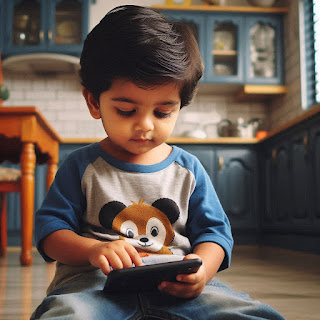How Social Media is Affecting Children's Development ?
Imagine a world where likes and comments dictate self-worth. For many kids, this is everyday life. Social media is now woven into childhood. It changes how children think, feel, and act. But is it for the better? The multifaceted effects of these platforms on growing minds is complicated. The good and the bad requires serious thought.
While social media brings positives, negatives also exist. It can impact thinking, social skills, and emotions. It is important to think of strategies to keep kids safe online.
Cognitive Development: Attention, Learning, and Creativity
Can TikTok ruin a child's ability to focus? Social media affects how kids pay attention. It also changes how they learn and be creative.
 |
Attention Span and Focus
Buzz! Ding! Another notification. Constant alerts pull kids away from what they're doing. Short videos and quick posts make it hard to focus long. Kids who spend too much time online may struggle with attention. It can even look like ADHD. Keeping their focus is difficult. It is like trying to catch smoke.
Learning and Information Processing
Social media can change how children learn. They might struggle to remember things. False information spreads fast online. Kids need to learn how to think critically. They need to know what is real and what is not.
Creativity and Imagination
Does social media make kids more creative or less? It depends. If they only watch, it might stifle imagination. But if they make videos or art, it can help them grow. Active creation is key. Being passive is not.
Social Development: Relationships, Communication, and Social Skills
Do online friends matter as much as real ones? How does social media shape how kids relate to others?
Online vs. Offline Relationships
Talking online is not the same as talking face to face. Kids might have many online friends. But are these real friendships? They might miss out on learning how to read body language. They need in-person skills. These are important.
Cyberbullying and Online Harassment
Cyberbullying is a big problem. It can hurt a child's mental health. Kids need to know how to deal with it. They must also know how to stop it from happening. Reporting and blocking are important tools.
Development of Empathy and Social Understanding
Can social media make kids less empathetic? It can. They might only see what they want to see. This creates "echo chambers." It is hard to understand others if you only hear one point of view.
Emotional Development: Self-Esteem, Identity, and Mental Health
How does social media affect a child's sense of self? The answer is complex. It changes as one ages.
Body Image and Self-Esteem
Perfect bodies and perfect lives fill social media. It's not real. Comparing themselves to these images hurts kids. They may feel bad about their bodies. Eating disorders are real issues.
Identity Formation and Self-Expression
Social media lets kids try out different identities. They can create online personas. But there is also pressure to fit in. Are they being true to themselves? Are they trying to be someone they are not?
Anxiety, Depression, and Loneliness
Studies show that more social media use can increase rates of anxiety. It can also increase rates of depression. Kids may feel lonely even when online. They compare themselves. They have FOMO (fear of missing out). Getting likes becomes all that matters.
The Positive Side: Benefits of Social Media for Children
Social media isn't all bad. There are some real benefits too.
Education and Learning Opportunities
Kids can learn a lot online. They have access to courses. They can also use educational platforms. Coding, learning a new language, or getting help with math are some things that are possible.
Social Connection and Support
Kids can find others who share their interests. They can build communities online. Support groups can also help when they're struggling.
Creativity and Self-Expression
Social media offers platforms for kids to be creative. They can share their art. They can make videos. TikTok, Instagram, and YouTube give outlets.
Practical Tips for Parents and Educators
What can parents and teachers do? How can they help kids navigate social media safely?
Setting Limits and Monitoring Usage
Set time limits. Know what your kids are doing online. Use parental control tools. Establish boundaries. This can help protect kids.
Promoting Digital Literacy and Critical Thinking
Teach kids how to spot fake news. Help them think critically about what they see. Digital literacy is vital. It can help protect them.
Encouraging Open Communication and Healthy Habits
Create a safe space. Let kids talk about their online experiences. Encourage healthy habits. This includes exercise and sleep. Get them offline!
Conclusion
Social media shapes kids. It offers both good and bad. It impacts thinking, socializing, and emotional well-being. Responsible use is key. Parents and educators must be proactive. Ongoing research is needed. Education and teamwork will help. It helps social media be a positive force for kids.
















0 Comments